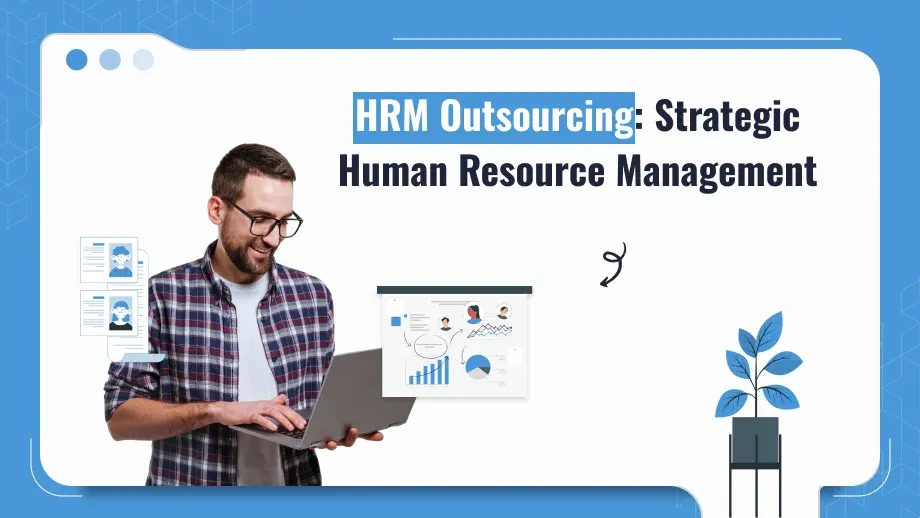
Most firms utilize outsourcing services to streamline their operations, reduce costs, and focus on core activities. The company hires third-party experts to offer HR services. They have the most recent technology available and they have the expertise needed to enhance the efficiency of human resource management. This blog will discuss HRM outsourcing, its advantages, disadvantages, and major considerations for businesses.
What is Outsourcing in HRM?
This practice refers to contracting certain human resource management activities to third-party service providers. This, as will be described, includes the services of payroll processing and benefits administration, as well as employee compliance management and recruitment.
Outsourcing HRM enables organizations to focus on strategic goals while other HR routine activities are taken care of. Here are the most common types of HR outsourcing:.
- Employee Outsourcing in HRM: Leaving the staffing needs to the external agencies.
- Training Process Outsourcing: The outsourcing of training and development to third-party providers.
- Outsourcing Human Resource Services – The vendor will provide full payroll, recruitment, and compliance management.
The Benefits of HRM Outsourcing
Outsourcing HR functions has many benefits, which makes it a popular choice for businesses. Let’s now look at some of the main advantages:
Cost Efficiency
In-house managing HR processes are very costly since they require specialized staff, technology, and compliance requirements. HRM outsourcing lowers these costs by making use of external expertise and scale economies.
For example: small and medium-sized businesses outsource payroll to avoid investing in costly systems like the HRMS Payroll Software in India to reduce overheads.
Access to Expertise
Outsourcing Human Resource Services – The vendor will provide complete payroll, recruitment, and compliance management.
Example: Organizations can outsource compliance management to stay updated with labor laws and avoid penalties.
Scalability and Flexibility
Outsourcing affords businesses the flexibility of adjusting HR services according to changing needs. Whether growing during peak seasons or declining during a slowdown, outsourcing HRM provides room for flexibility.
For example: by outsourcing employees, temporary staffing helps to prevent workload fluctuations.
Enhanced Technology and Tools
Most hr outsourcing in hrm providers have high-tech tools and systems for managing HR functions efficiently. In this way, a business can obtain high-tech tools without investing heavily by forming an alliance with such providers.
Example: Advanced HRM payroll systems streamline payroll processing and reporting.
Your HR strategy needs to be transformed
Get started with HR outsourcing today and discover the benefits!
Key Functions in HRM Outsourcing
Payroll Management
Payroll processing is one of the most common functions outsourced in HR. It sends salaries, taxes, and compliance to outside service providers with accuracy and within the specified time.
Recruitment and Onboarding
In recruitment process outsourcing, the outsourcing agency manages the logistical aspects and leaves the business to pick from its candidates. Providers often apply tools like sophisticated software to make it simple to hire.
Employee Training and Development
Training process outsourcing in HRM ensures employees receive specialized training aligned with organizational goals. External providers bring expertise in creating tailored training programs.
Compliance Management
Compliance with labor laws and industry regulations is very important. Outsourcing providers for HR manage and monitor compliance-related activities that help businesses reduce risks.
Employee Benefits Administration
Outsourced benefit administration ensures proper management of employee benefits, such as health insurance, retirement, and other benefits.
Challenges in HRM Outsourcing
While HRM outsourcing has its benefits, this partnership needs to be appropriately dealt with to avoid potential negatives. Some additional points will have to be considered, as it is a complex negotiation to take place in the domain of HRM outsourcing are discussed below:
Communication Gaps
The communication becomes fragmented while outsourcing HR functions and if the outsourcing partner is distant geographically or in another time zone. This may lead to late service, miscommunication, or variable delivery.
Solution: Have clear communication protocols, assign points of contact, and schedule regular updates to keep the parties involved informed.
Employee Resistance
The employees will feel uncomfortable and less secure when HR tasks are outsourced, especially sensitive ones such as payroll or performance reviews. This can contribute to mistrust or lowered morale.
Solution: Have open communication with the employees explaining why the decision has been made to outsource. Highlight the benefits to increase efficiency.
Quality Control
Sometimes, the outsourcing companies will not meet the level of quality expected, thereby influencing the overall employee experience and compliance efforts.
Solution: Determine performance metrics in the service level agreement (SLA) and regularly monitor adherence to those standards by the provider.
Dependency on Third Parties
This would leave the organization vulnerable to disruption if its outsourcing partner failed to deliver or terminated the partnership on short notice.
Solution: Keep contingency plans and study multi-vendor strategies that enable avoiding over-concentration on one vendor.
Limited Customization
Some of the outsourcing providers provide standardized solutions that may not match the requirements or culture of an organization. This can lead to a mismatch between the requirements of the company and the services provided.
Solution: Choose providers that offer flexible and customizable HR solutions to better meet organizational goals.
Risk of Vendor Lock-In
Long-term contracts with outsourcing partners create vendor lock-in. So contract redlining is essential to avoid these risks ensuring fair agreements.
Solution: Negotiate flexible contracts with provisions for periodic reviews and the option to exit without heavy penalties.
Integration Issues with Technology
It is difficult and time-consuming to integrate the systems of the outsourcing provider into existing company tools such as payroll software or performance management.
Solution: Choose providers whose technology is compatible with those already in use, say HRMS Payroll Software in India or cloud-based tools.
Data Localization Challenges
It can be difficult for HRM providers to ensure that their clients comply with the local laws regarding data privacy when they operate in more than one nation. The GDPR as well as regional regulations may be included.
Solution: The SLA must include clauses on response time, the escalation procedure, and penalties for non-compliance.
Lack of Immediate Problem Resolution
Outsourcing providers cannot always be responsive to emergent HR issues immediately. This often results in delays in the resolution of urgent issues such as payroll errors or compliance infractions.
Solution: The SLA should include clauses for response time, escalation process, and penalty clauses for non-compliance.
How to Choose the Right HRM Outsourcing Partner
The right outsourcing partner is critical to the success of outsourcing human resource services. Considerations for a successful business
Define Your Needs
Identify which HR functions to outsource and ensure they align with your strategic goals.
Evaluate Expertise
Choose a provider with a proven track record in managing similar HR functions. Look for experience in areas like employee outsourcing in HRM and compliance management.
Assess Technology
Ensure the provider uses advanced tools and systems like the Top HRMS to enhance efficiency and accuracy.
Check References
Request references and case studies to understand the provider’s performance and reliability.
Review Contracts Thoroughly
Understand the contract terms, including SLAs, costs, and data security measures.
Future Trends in HRM Outsourcing
Businesses are dynamic, and so is the concept of outsourcing HRM. The following are emerging trends that will determine the future of outsourcing HRM:
Technology-Driven Solutions
Today, AI and automation are a part of HRM processes. These technologies are used by service providers to improve efficiency and accuracy.
Focus on Employee Experience
Outsourcing providers have increased their focus on building employee engagement and satisfaction with customized HR services.
Globalization
HR outsourcing is an international expansion where companies can use global talent pools to manage teams around the world.
Strategic Partnerships
Outsourcing has now evolved from transactional services to strategic partnerships where the service provider plays a more significant role in helping the business achieve its goals.
Examples of Successful HRM Outsourcing
- Tech Startup Outsourcing Payroll: A growing startup utilized HR software for startups in managing payroll and compliance. This allowed the internal resources to focus more on the products being developed.
- Retail Chain Process Outsource for Talent Acquisition A retail chain hires an outsource company to help it streamline the hiring process and reduce its time-to-hire by 30 percent.
- Manufacturing Firm Training Process Outsourcing In HRM, a manufacturing firm makes employees more productive through training process outsourcing.
Conclusion
More than saving money on HRM is the way to operational excellence and strategic alignment. It means outsourcing HRM activities by business organizations to professionals and concentrating on core objectives and becoming efficient to remain ahead of the competition in the market. After all, finding the right partner for outsourcing and managing various problems such as data security and cultural alignment are most important to be successful in this area. The technology role in HR is further going to take more momentum, and human resource management is going to face massive transformation through outsourcing; then start exploring HRM outsourcing today and unlock new scopes towards growth and success.









